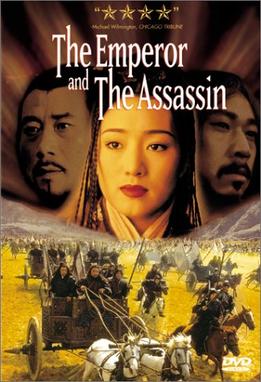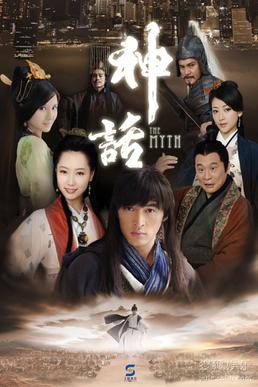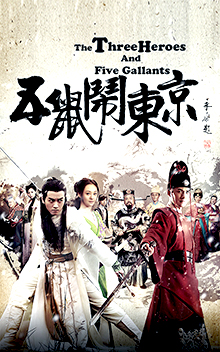Gao Jianli was a musician of the Chinese state of Yan, during the Warring States period, who played a struck zither called zhu or ji zhu.

The Emperor and the Assassin, also known as The First Emperor, is a 1998–1999 Chinese historical romance film based primarily on Jing Ke's assassination attempt on the King of Qin, as described in Sima Qian's Records of the Grand Historian. The film was directed by Chen Kaige and stars Gong Li, Zhang Fengyi, Li Xuejian, and Zhou Xun. The film was well received critically and won the Technical Prize at the 1999 Cannes Film Festival. It was the most expensive Chinese film made up to that time, costing US$20 million.

The Emperor in Han Dynasty, also released under the title The Emperor Han Wu in some countries, is a 2005 Chinese historical drama television series based on the life of Emperor Wu of the Han dynasty. It uses the historical texts Records of the Grand Historian and Book of Han as its source material.

Romance of the Three Kingdoms is a Chinese television series adapted from the classical 14th century novel of the same title by Luo Guanzhong. The series was produced by China Central Television (CCTV) and was first aired on the network in 1994. It spanned a total of 84 episodes, each approximately 45 minutes long. One of the most expensive television series produced at the time, the project was completed over four years and involved over 400,000 cast and crew members, including divisions of the People's Liberation Army from the Beijing, Nanjing and Chengdu military regions. Some of the dialogue spoken by characters was adapted directly from the novel. Extensive battle scenes, such as the battles of Guandu, Red Cliffs and Xiaoting, were also live-acted.

Three Kingdoms is a 2010 Chinese television series based on the events in the late Eastern Han dynasty and the Three Kingdoms period. The plot is adapted from the 14th century historical novel Romance of the Three Kingdoms and other stories about the Three Kingdoms period. Directed by Gao Xixi, the series had a budget of over 160 million RMB and took five years of pre-production work. Shooting of the series commenced in October 2008, and it was released in China in May 2010.

The Water Margin is a 1998 Chinese television series adapted from Shi Nai'an's classical 14th-century novel of the same title. It was produced by CCTV with Zhang Jizhong as producer. It was first broadcast in China in January 1998. The series also featured action choreography by Yuen Woo-ping.

Assassinator Jing Ke is a 2004 Chinese television series based on a semi-fictional story of the assassin Jing Ke, who, in 227 BC, attempted to kill Ying Zheng, the king of Qin. Directed by Raymond Lee, the series starred Liu Ye as the titular protagonist, with Peter Ho, Zheng Jiayu, Zhang Tielin, Shao Bing and Zhai Ying playing supporting roles.

Qin Shi Huang is a Chinese historical drama television series based on the life of Qin Shi Huang, the first emperor who unified China under the Qin dynasty, in 221 BC. The series was filmed between 1999 and 2000 and first released in 2001 in Hong Kong and Thailand, and in 2002 in Singapore. In China, the series was edited and altered by historians and experts before it was approved for broadcast on CCTV-1, in 2001.

The Myth is a 2010 Chinese television series based on the 2005 Hong Kong film of the same title. Jackie Chan, who starred in the original film, was credited as the producer for the series, while Stanley Tong, who directed the film, was the creative director for the series. The series was first aired on CCTV-8 in China in January 2010.

All Men Are Brothers is a 2011 Chinese television series adapted from Shi Nai'an's 14th century novel Water Margin, one of the Four Great Classical Novels of Chinese literature. The series is directed by Kuk Kwok-leung and features cast members from mainland China, Taiwan and Hong Kong. The series was first broadcast on 8TV in March 2011 in Malaysia.
Chinese Film Performance Art Academy, founded in January 1985, is a professional organization of Chinese actors.

The Rise of the Tang Empire is a Chinese television series based on the events in the Zhenguan era during the reign of Emperor Taizong of the Tang dynasty. The 50 episodes long series is directed by Zhang Jianya and written by Ah Cheng and Meng Xianshi. It was first broadcast on BTV in China in December 2006.

The Patriot Yue Fei is a 2013 Chinese television series based on the life of Yue Fei, a Song dynasty general widely regarded as a patriot and national hero in Chinese culture for his role in defending the Song empire against the Jurchen campaigns. While the plot is based on historical sources, it also includes elements of fiction and draws ideas from the novel General Yue Fei (說岳全傳) and other folktales on the general's life.

Justice Bao is a Chinese TV series starring producer Jin Chao-chun as the Song dynasty official Bao Zheng. The series ran for 3 seasons from 2010 to 2012. In addition to Jin, Kenny Ho, Fan Hung-hsuan and Lung Lung again reprise their iconic roles from the 1993 Taiwanese hit Justice Pao and the 2008 Chinese series Justice Bao.

The Three Heroes and Five Gallants is a 2016 Chinese television series produced by Huayi Brothers with Tianxing Yiyuan Entertainment (天星亿源影视), based on the 19th-century classic novel of the same name. Starring Chen Xiao, Yan Yikuan and Zheng Shuang, the series premiered on February 17, 2016, on Anhui TV.

Su Dongpo is a 2012 Chinese historical TV series produced by China Central Television. It was first shown in 2012, although it was filmed in 2007.

The King's Woman is a 2017 Chinese television series starring Dilraba Dilmurat and Vin Zhang. It is adapted from the novel The Legend of Qin: Li Ji Story (秦时明月之丽姬传). The series aired on Zhejiang TV every Monday to Wednesday, from 14 August to 4 October 2017.

Iron Ladies is a 2018 Taiwanese television series created and produced by SETTV. It stars Aviis Zhong, Ben Wu, Ada Pan, Zhu Zhi-Ying as the main cast. It was first broadcast on 10 January 2017 on SET Metro and airs every Friday night from 10pm to 11.30pm.
















